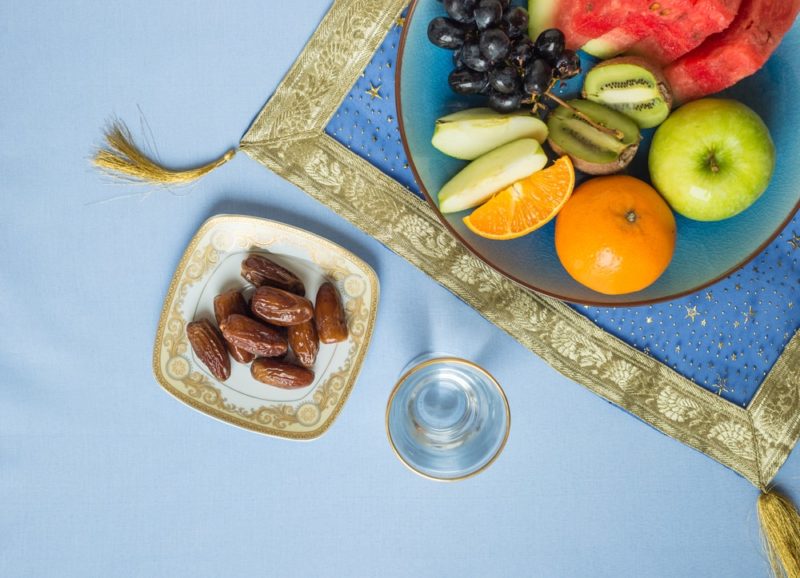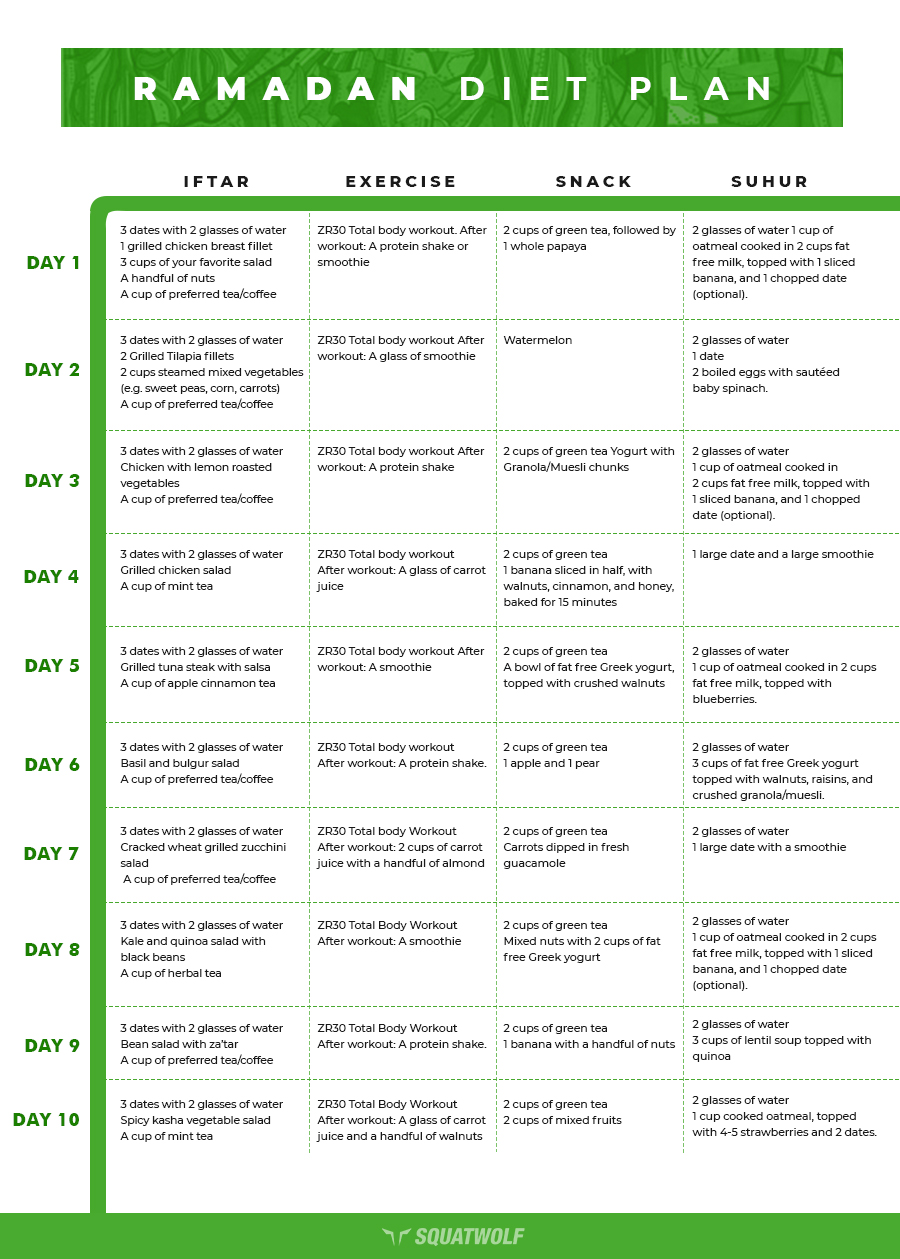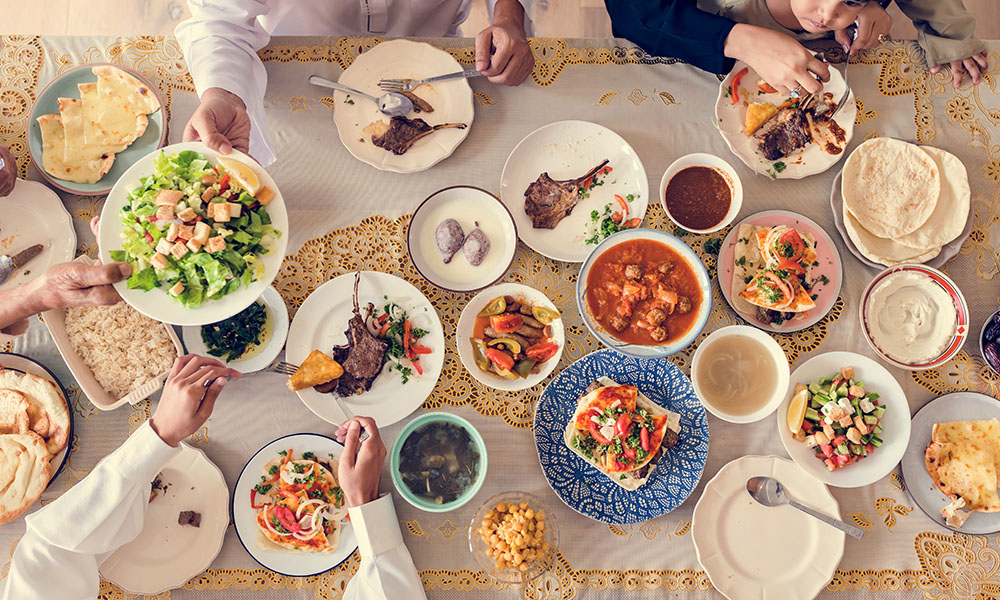The month of Ramadan is here and this is good news for all you fitness freaks out there. No! You cannot stop working out just because you are fasting. You should take advantage of this month to the fullest and carefully choose the foods to eat in Ramadan that will keep you satiated, energized and on-track with your fitness goals.
Yes, it is a struggle to work out in Ramadan. However, the bigger concern is being reckless with what you put in your body and having unhealthy eating patterns. This can have its effects even after Ramadan, if you aren’t careful.
If you’re trying to self-improve, then learn how to get fit in Ramadan.
Iftar | Dinner | Suhoor | Foods To Avoid | 10-Day Diet Plan | Conclusion | FAQs
The Complete Ramadan Diet Plan
Iftar

As opposed to popular opinion, iftar shouldn’t be seen as an all-out feast. It should only be considered as a small meal to replenish your water and natural sugars.
So keep your hands off of all those fried goodies and calm yourself down. Opt for fruits, fresh juices, and milk to bring your water levels and nutrients back up, giving you enough energy for the post tarawih workout.
Iftar should not be the biggest meal of the day, it should simply be a refreshment for when you break your fast. Keep some room for your dinner.
Learn more about the Ramadan food and diet plan from none other than Mahmood Hussein so you’re consuming a healthy diet throughout the month!
Dinner

Dinner should be the most massive meal you have during the month of Ramadan. You need to stay calculated with what you intake for dinner and we are here to guide you.
Complex Carbs
Carbs are important since they slowly release energy throughout the day. This can be your fuel to get through the day on an empty stomach. Some great sources of complex carbs can be rice, whole grain bread, oats, lentils and potatoes.
Learn more about Ramadan nutrition do’s and don’ts so you can stay healthy and fulfilled throughout this month,
Proteins
Proteins take the longest time to break down. The slow process helps you curb any cravings you might have. This can also be a great option for muscles if you are having dinner after your daily workout.
A few examples for this can be baked or grilled chicken, beef, lamb, eggs, chickpeas, bean, fish and other seafood.
Incorporate protein smoothies to your Ramadan diet on Iftar or post-tarawih to keep your gains growing!
Vegetables
Vegetables can be a great source of fibers and since they are low in calories, they can help you get lean. Some of the vegetables that can help you during this month are green leafy vegetables, onion, cucumbers, carrots, and cauliflower.
Want some light Iftar options? Prep these 5 vegetarian recipes under 500 calories!
Dairy
Dairy is not very popular but essential to give you those much-needed nutrients. Some people may be lactose intolerant, but it can be consumed in different forms and moderate amounts. Try adding cheese slices, yogurt, or cottage cheese to your dinner is Ramadan.
If you struggle with gut health, try 5 healthy snacks on Iftar!
Healthy Fats
You will have to add healthy fats mostly during your cooking or prep. They are high in calories so they should be consumed in small amounts but can serve as extremely beneficial for you during your fasting hours as you will have more energy.
A few examples of healthy fats are avocado, hummus, and olive oil.
Learn the right way to do intermittent fasting this Ramadan to lose weight!
Suhoor

Suhoor is basically your last refill before the fast begins so you need to make sure that you consume all the essential nutrients you need to go on the rest of the day.
It is advised to have complex carbs, proteins, and healthy fats during Suhoor keeping you filled and energetic for several hours. Be sure to not overeat as it can make you lethargic the rest of the day. Peanut butter toast with banana slices, eggs and smoothies can be a great option for Suhoor.
Want to really burn calories and feel your best this month? Check out Tam Khan’s guide on intermittent fasting and working out!
Food You Need to Avoid

These foods a big “No No” during Ramadan. As difficult as this may seem, try to avoid them as much as possible.
- Fast and processed food, such as burger, chips, deep fried chicken and samosas are not a good option.
- Refined carbs such as white bread and white flour should be avoided as much as possible.
- Too much fatty foods such as oily curries and anything fried which drips of oil. Is going to destroy your body. Don’t do that to yourself
- Too much sugar is never good this means try holding back on the pastry, cakes, traditional sweets, etc.
- Avoid spicy food which may upset the stomach with indigestion and bloating.
- Reduce your caffeine intake from coffee, tea, and sodas as it dehydrates the body.
Restructure your diet and work out routine with these 15 tips this Ramadan!
A Diet Plan for Ramadan

This plan is for 10 days which can be repeated for each Ashra. Keep in mind that this plan is not ironclad and you can make a few amendments to it as necessary.
For a deeper understanding of your diet, nutrition and overall plan, take a look at the complete guide to fasting!
In Conclusion
Ramadan can be a fitness freaks nightmare or the best month of the year depending on how you look at it. Most people that are looking to lose weight use Ramadan as the perfect month to do so. Keep in mind that you cannot use Ramadan as an excuse to not work out.
Eating healthy and exercising is a way to take care of your body and taking care of your health is a blessed act.
FAQs
The best diet in Ramadan is the one that is nutritious, balanced and replenishes your energy and hydration levels. Here’s what you need to do – start off with complex carbs such as oats, lentils, whole grains and proteins such as yougurt and eggs to keep you energized and satiated at Suhoor. For iftar, add dates and water to your diet for a simple yet effective boost of hydration and glucose levels in your body. You can also add a few salads here and there. In your dinner, add complex carbs, fats, proteins and veggies so you’ve got a bit of everything to keep you feeling full and charged.
To lose 10 kg in Ramadan, you need to focus on what you put in your body and your fitness levels. To do this, you need to:
- Go in a caloric deficit so you’re consuming less, which enables your body to shred those extra pounds. For instance, if your average recommended calorie intake should be 2000 kcals, you should maintain a 1700 kcals diet.
- Focus on whole foods, healthy fats, carbs, proteins and fiber into your diet so you feel full while allowing your muscles to repair and grow at the same time.
- Add low impact, low intensity physical activity such as walking, yoga, stretching, Pilates and even lifting light weights to get your metabolism working.
- Drink more water so you’re hydrated and replenished.
- No sugar, no fried foods and no processed foods so you save up on those unnecessary calories.
The rules for Ramadan diet are simple – working on our spiritual growth while taking a balanced diet during your non-fasting hours. To break it down, the key rules are:
- Abstaining from consuming food or drinks from Suhoor to Iftar
- Breaking your fast with dates and water to keep your body from going into shock-mode. This way, you’ll gently reintroduce nutrients into your body.
- Incorporating a balanced nutrition such as carbs, fibers, fats, and of course, proteins to support your health and energy levels for the fasting hours to come.
- Avoid overeating after you break your fast so you don’t end up feeling too lethargic for your workouts or prayers.
- Focus on practicing mindfulness by eating slowly so you can improve not just your satisfaction from the meals but improve your digestion.

